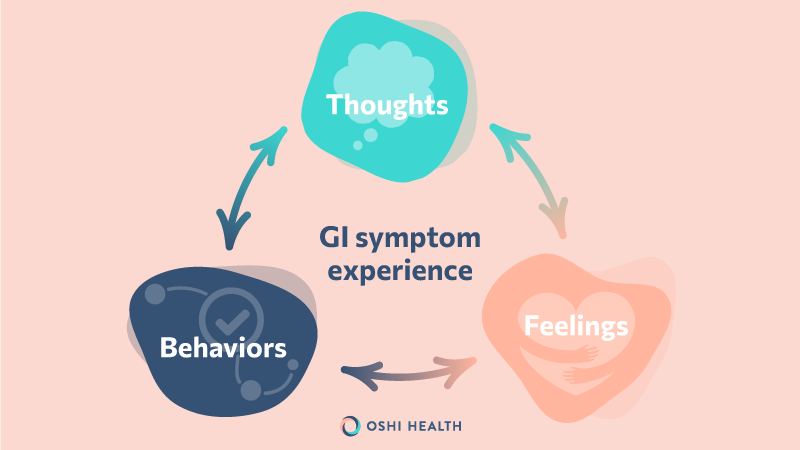
Living with chronic GI symptoms is stressful. The ongoing discomfort and unpredictability can affect every aspect of your life — causing worry about work, personal relationships, and more. You might even anticipate and feel anxious about symptoms when you aren’t experiencing them.
Adding insult to injury? When we’re worried or stressed, we tend to feel it in our guts, creating a vicious cycle of reinforcement.
Fortunately, there are cognitive tools that can calm your mind and your gut. These tools aim to bring awareness to your thoughts, feelings, and behaviors as they relate to your physical symptoms.
It’s not “all in your head”
Focusing on your thoughts doesn’t mean it’s all in your head. Rather, our brains and our guts are in constant communication. When stress and other heightened emotions disrupt this connection, the digestive tract receives distress signals that can trigger symptoms.
Cognitive tools give you the power to break this cycle. While you can’t control the thoughts that pop into your head, you can change how you respond to them and even learn to shift your perspective, reframing your thoughts in a more helpful way.
With support from your GI Behavioral Health provider, you can begin to adjust thought processes to better manage or prevent symptoms. Cognitive tools can:
- Promote healthy gut functioning and resolve GI distress
- Reduce stress that amplifies abdominal pain sensations
- Increase flexible thinking, and help you understand and manage your symptoms
Oshi Health GI Behavioral Health providers have expertise in evidence-based, gut-focused cognitive tools and will tailor them to meet your needs. Your personalized treatment plan may include:
- Belly breathing to activate your body’s relaxation response
- Logging your thoughts to identify patterns
- Recognizing and changing unhelpful thinking styles
- Problem-solving techniques to enhance adaptive coping skills
Through these short-term treatment approaches, you can learn cognitive skills to find lasting relief.
Thought logging
Thought logging involves recording your physical and emotional responses to various symptom-related situations. The goal is to help you uncover patterns between your thoughts, feelings, and symptoms.
Log your thoughts whenever you experience a distressing situation involving your GI symptoms, using the worksheet below.
Download thought logging worksheet (PDF)
Changing unhelpful thinking styles
Do you feel stressed or anxious about your gut? Examining and challenging unhelpful core beliefs behind these thoughts — such as catastrophizing, perfectionism, and emotional reasoning — can lead directly to symptom relief.
Review the unhelpful thinking styles listed in the chart below, and start to identify how you could challenge some of these beliefs.
View unhelpful thinking styles chart (PDF)
Problem solving for gut health
Problem solving techniques can help you better cope with both stress and your GI symptoms. By recognizing what’s in your control and what’s beyond your control when it comes to your gut, you can bring awareness to and begin to shift your body’s response.
Use the problem solving worksheet to work through a distressing situation related to your GI symptoms.
Download problem solving worksheet (PDF)
The Oshi Health approach
During your visits, your Oshi Health care team will review your worksheets with you and help you shift your mindset to think about your gut in more hopeful, positive ways. Positive thought processes will become more natural as you practice over time.
